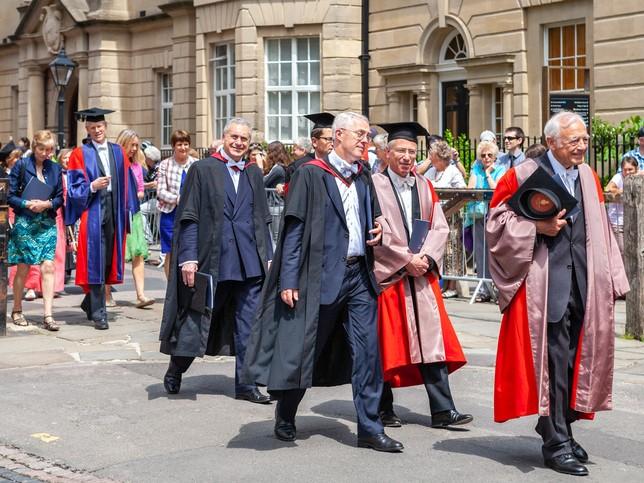
It’s crucial for universities to bridge the ‘town and gown’ divide

You may also like
The comedian Steve Coogan and actor Sally Hawkins have brought to the silver screen a tale of how the skeleton of King Richard III was finally exhumed from a Leicester car park. The Lost King is a work of faction – fact with a dose of fiction – or, as the blurb describes it, a comedy drama. For example, a spectre of the late monarch is seen to converse with the protagonist – the community scientist, Phillipa Langley, a skilled and driven “amateur”/citizen.
The above reminds us that higher education institutions exist in cities and towns and, therefore, have a direct impact – for good or ill – on their surrounding communities. But in the process of pursuing teaching and research excellence, are universities sacrificing the interests and needs of local people? Are teaching academics viewing their localities just as a convenient live laboratory – for student placements, contemporary project assignments and areas for study – without necessarily requiring feedback and improvement for the hosts?
- Community-engaged learning: a pedagogic approach to civic outreach
- Food for thought: advice for building a university-community collaboration
- Being a public scientist is not an easy choice
Universities carry the possibilities for both positive and negative impacts on their surrounds. On the positive side, there is local employment, income and custom for local shops and services, as well as attractive campuses and buildings that may draw tourists. But equally, universities can affect local housing markets, force up rental prices and distort communities, given that many (younger) students may only be physically present in those communities from October to June. In terms of campus buildings, to what extent does the immediate locality benefit from new builds? Are contracts offered to local companies to build new campus facilities?
“Town and gown” is a slur for the division that can arise between a university and its immediate geographical community. I would argue instead for the ideal set down by philosopher of science JD Bernal, who urged us to be citizens first and academics second. In other words, we all live somewhere as a citizen – in villages, towns or cities – and should contribute on that basis. We should not be limited and defined solely by our academic discipline or day job – although specialists in fields such as marketing, writing, finance and botany may well be valuable volunteers and contributors to community projects.
Surely, a key part of any overarching university strategic plan should emphasise the import of being a good neighbour and enabling local communities and residents to achieve the goals they pursue? Take the example of local businesses being able to tender and provide services to the university. This can be a very practical and simple input to the local economy, not to mention a contribution towards sustainability by reducing travel miles for goods and materials.
Another aspect of neighbourliness is brought out in The Lost King, and that is the importance of treating local people with respect and having the humility to recognise that wisdom exists beyond the confines of academe, rather than looking down academic noses to judge residents as of only passing interest. And all this not least because “citizen science” is now an accepted approach to generating large data sets (for example about Covid) to maximise the usefulness of research to and for humanity.
As such, I end by recommending a simple, cheap way to take the university out of its ivory towers and into the community, which I piloted in Cheltenham during the early 2000s. First, hire a room in a pub on an unfavoured night for business (for example, a Wednesday evening). Then collar a colleague to deliver a 15-minute talk to introduce a topic, set the scene and animate listeners. After the short intro, people at their tables discuss the topic for about 20 minutes and are then invited to feed back to the room and/or ask questions of the speaker or others in the audience. The conversation lasts for as long or as little as people’s interest. (Let me be clear that I lay no claim to what has existed for a long time as “café society” or “café conversations”.)
The topics covered back then included: “Is climate change real?”; “Fatboy slim: adolescent obesity”; “Evil – does it exist?” and more. All of which were research areas for colleagues. Audiences were enticed in with a free first drink (covered by a small university grant) and participants were a relatively even split between students, staff and members of the public.
Outcomes included 40 to 50 people turning out regularly and, as already mentioned, one of the benefits was that no one was identifiable as “town” or “gown”. In terms of age, attendees were 20-plus with a heavier presence of 40-year-olds and above. Another positive was the university being seen to be active beyond its campuses. For staff, it was also a simple way of getting their research in front of a wider audience and showing how it related to the “real world”. Plus, of course, most local pubs are delighted to have 40+ punters on a midweek evening.
In terms of barriers, the key one was administering an email list of (potential) attenders; this needs to be kept up to date by someone – perhaps a faculty/departmental administrator. There is also much enthusiasm needed to twist the arm of colleagues to do their introductory spiel.
And finally, this small intervention can be linked to a wider recommendation for the sector about how it can address the issue of (perceived) aloofness. It can also “piggyback” on other events and festivals. And as an extension of this, it is worth checking to see if university venues could also be offered for music, poetry and other public festival performances.
James Derounian lectures on community governance. He is a national teaching fellow and visiting professor at the University of Bolton, UK.
If you would like advice and insight from academics and university staff delivered direct to your inbox each week, sign up for the Campus newsletter.


